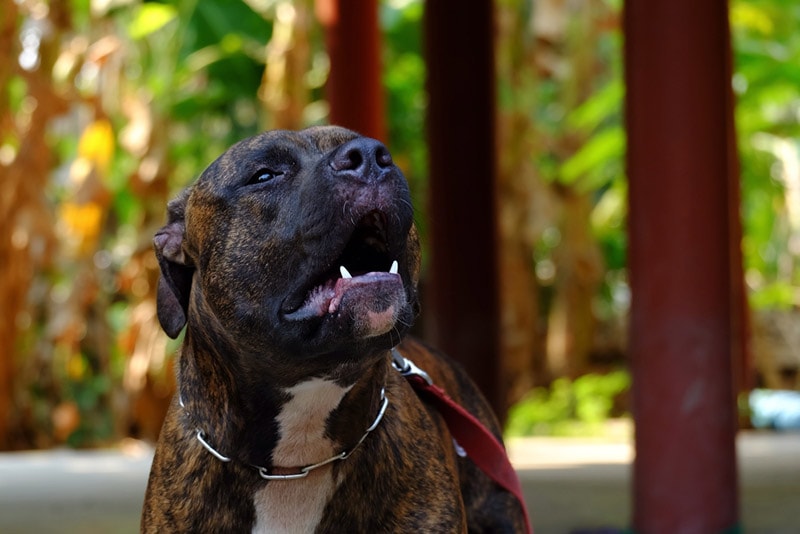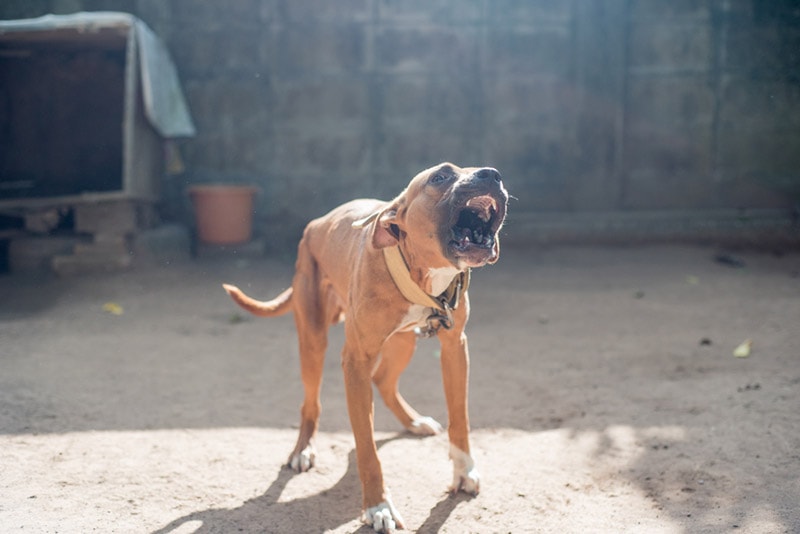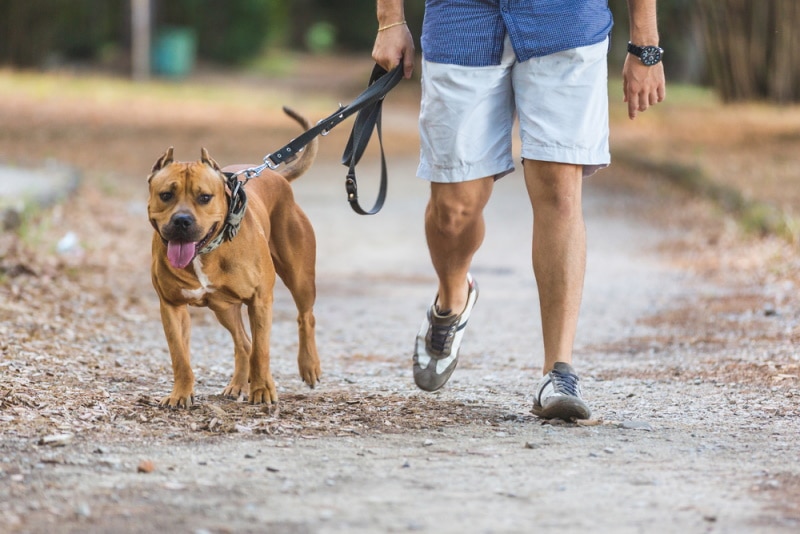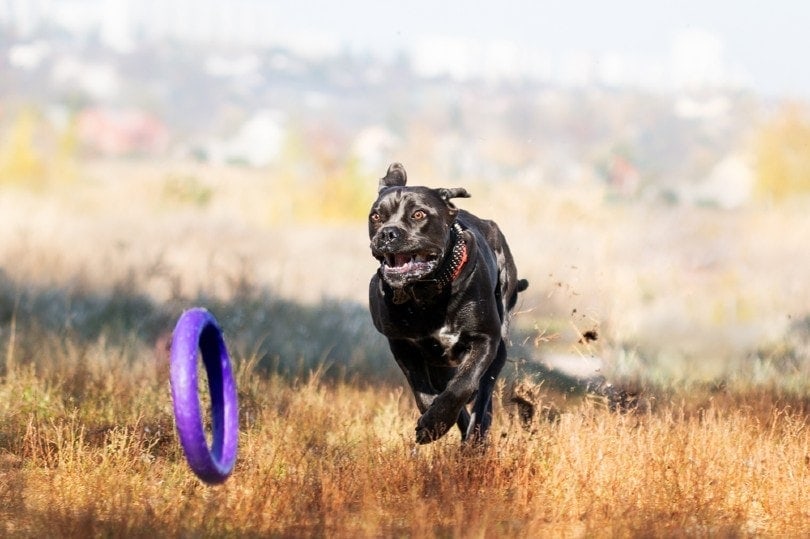Do Pitbulls Bark a Lot? The Interesting Answer

Updated on

In the world of talkative canines, there are Chihuahuas, Poodles, and German Shepherds at the loud end of the spectrum 1 . Likewise, Basenjis, Pugs, and Great Danes on the quiet side. Pitbulls fall somewhere near the middle, toward the quiet side making them moderate barkers.
Of course, some Pitbulls bark more than others because each dog has a unique personality. Moreover, other factors such as genetics, age, environment, and training influence how much a dog barks.
Nevertheless, Pitbulls are intelligent dogs and generally won’t bark without reason. They do it when being protective, afraid, provoked, excited, or bored, among other reasons. Below, we tell you when you should expect your Pitbull to bark. We also throw in a few tips on stopping the behavior. Read on to learn more.
Why Pitbulls Bark
Several triggers can set a Pitbull off. However, it is important to remember that Pitbulls have varying personalities. So, don’t be alarmed if your dog gets triggered by something we didn’t include in the list.
1. When Being Protective
Pitbulls love their family and will do anything to protect them. It is part of what makes them great family dogs.
If they perceive potential danger, they bark incessantly to fend off the intruder, whether a human being or another animal. Sometimes they will even follow it up with aggression. Of course, dogs will misread situations all the time. Therefore, taming this behavior before it becomes aggressive is imperative.

2. To Protect Themselves
A Pitbull will protect itself fiercely if it perceives something as a threat. Although it will not hesitate to attack a predator, its first line of defense is usually barking.
Barking is an intimidation tactic meant to scare off predators. But often, the threat is not real. Therefore, It is important to train your furry friend to cease the behavior when they are still a puppy.
3. When Anxious
Pitbulls are prone to separation anxiety and will voice their frustrations through incessant barking. They will often follow this up with behaviors such as pacing and destructiveness.
Being a family dog, a Pitbull doesn’t like being left alone. The barking is an attempt to get you to come back.
It is advisable not to leave your dog alone for long. If you must go, leave the pup under someone else’s care. A boarding service can be a great option if you can’t find someone you trust.

4. When Afraid
Most people consider Pitbulls tough and mean. So, it might be hard to imagine them being scared of anything.
The truth is that all dogs get scared. In particular, many things can make a Pitbull afraid, including loud noises and unfamiliar sights. Sometimes the fear is justified, like when they meet other aggressive dogs. But you may have to desensitize your pup if it’s scared of harmless objects and situations, such as bicycles and people in hats.
5. When Bored
Pitbulls have lots of energy and require mental and physical stimulation. Therefore, they are likely to get in trouble if bored. They will chew on objects, run, or bark relentlessly. These dogs love being around family. So, you can ensure they get proper stimulation by doing activities together, such as walking, hiking, and playing.
If no one is around, consider getting a pet sitter to keep the dog company. Alternatively, you can keep it busy and stimulated with chew toys and puzzles.

6. To Seek Attention
Pitbulls crave your love and affection. But they will settle for negative attention if they feel you are not providing any. That’s why they bark incessantly, even when they know you won’t like it.
It is better to ignore your pup when they bark to get your attention. Otherwise, you risk reinforcing the behavior by responding. Wait until they stop barking and then attend to their needs. That way, they will stop associating your attention with their barking.
7. When Provoked
Pitbulls don’t like to be teased or harassed. They react with a loud bark like other dogs when they reach their limit.
The bark is usually a warning for the provoker to either stop or back off. And things can get ugly if it’s not heeded. A Pitbull is a strong muscular dog that can cause great harm if it gets aggressive. So, knowing when your pup has reached its limit is critical.

8. When Excited
Not every bark from your dog is a negative reaction. Sometimes pups bark when they get excited. It would be nice if dogs had other ways of communicating their feelings. Unfortunately, barking is one of the few available.
The good thing is that you can distinguish a “happy” bark by observing your dog’s behavior. Besides barking, fido might wag its tail, jump, or run in excitement.
Many things could excite your Pitbull. Perhaps they are happy you got home or overjoyed at the prospect of dinner. Even throwing a ball during a game of catch could evoke high-pitched joyous barks.
How to Stop a Pitbull from Barking
It is impossible to stop your Pitbull from barking entirely, although one can dream. However, you can control it by eliminating some of the causes. Of course, you must first find out the reason behind the barking.
Socialization
Pitbulls come from Old English Bulldogs, originally bred for dog-fighting and bull baiting. As such, the breed tends to be less tolerant of other animals.
Socializing your Pitbull means familiarizing it with different situations, people, and animals. It makes it well-adjusted and sensible, ensuring it remains calm in unfamiliar territory.
The best time to start socializing a pup is when they are young. It would help if you also reinforced it as they age to ensure they are not fearful as adults.
Exercise
Your Pitbull will bark if it doesn’t find a way to release excessive energy.
Regular walks and hikes can go a long way. But it would be best if you supplement them with daily play sessions that include popular games like tug-of-war and catch. Still, that may not be enough for a high-energy Pitbull. You might have to consider signing them up for agility training or canine sports classes.

Keep Them Occupied
Pitbulls can get bored easily and won’t hesitate to fuss about it. Therefore, you have to keep them occupied if you want to stop the incessant barking.
Providing adequate physical and mental stimulation is imperative. So, set aside time for walks, hikes, and exercise.
Chewing toys and puzzles can occupy your Pitbull’s mind when you are not around. Although it is not advisable to go away for long, you can hire a pet sitter if you have to.
Training
Training should start when your dog is young. Besides reducing barking, it can help keep your strong, muscular Pitbull in control.
Positive reinforcement during training is always more effective than reprimanding. So, instead of scolding your pup for barking, consider offering food, treats, and praise for not barking. Remember, you must be patient and consistent if you want the training to work. Other members of your household need to be onboard too.
Final Thoughts
Pitbulls are moderate barkers. While most will bark occasionally, they are intelligent dogs and never bark for no reason. A Pitbull will bark when feeling protective, afraid, anxious, threatened, excited, provoked, or seeking attention.
It is impossible to stop your dog from barking. However, you can control the behavior through socialization and training. Providing for your pup’s needs will also help.
Featured Image Credit: SunyawitPhoto, ShutterStock












